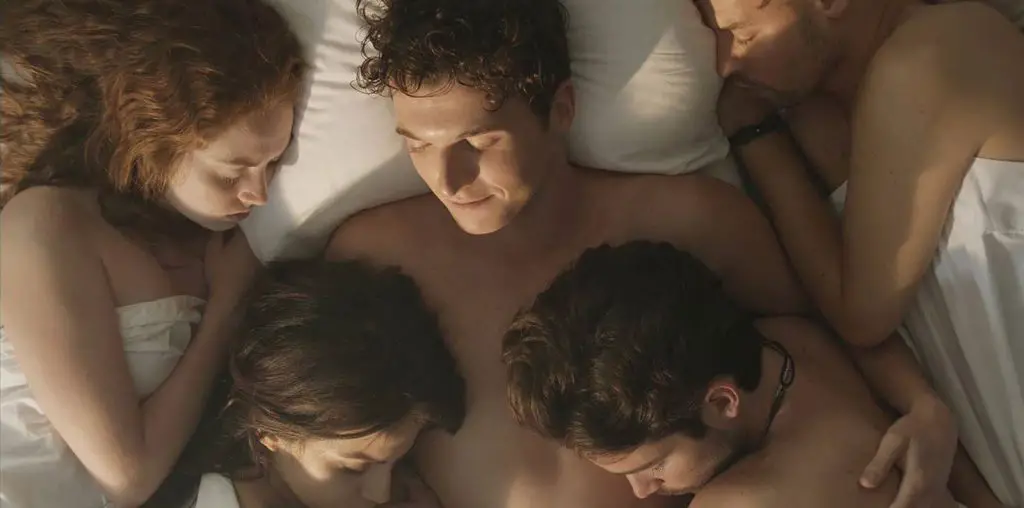
You know that life is cruel and unfair when the likes of Halle Berry, Marisa Tomei and Mira Sorvino can win Academy Awards and Isabelle Huppert has never been nominated for the Oscar. For the past three decades, this vibrant French actress has put forth a series of stunning performances, which capture all aspects of the human experience with style and skill unmatched by any performer in any country. From the intense dramatic performances in “Madame Bovary,” “La Separation” and “The Piano Teacher” to the delightful eccentricity of “8 Women,” Huppert has been an extraordinary force of talent.
“La Vie Promise” (“The Promised Life”) is among Isabelle Huppert’s finest performances. This amazing tour-de-force presents Huppert in a role, which is equal parts abrasive and vulnerable, exasperating and pathetic, monstrous and saintly. It is impossible to imagine another actress who could encompass the demands of her character and present this individual as a living/breathing creation who demands our attention and takes our breath away.
Huppert’s role is that of Sylvia, a prostitute in Nice who seems stuck in an outdated sense of rebellion chic. With her Debbie Harry/Blondie t-shirt, tight jeans and leather jacket, she’s an 80s girl who never quite came into the 21st century. And as the camera gets closer, her cosmetic attempts to maintain the illusion of youth are clearly in vain.
Sylvia’s 14-year-old epileptic daughter Laurence is in foster care and Sylvia would prefer not to know she exists. Laurence, needy for attention, keeps turning up in Sylvia’s world and is present when her mother’s pimp turns violent. Laurence fatally stabs the scum, forcing mother and daughter to hastily pack and head out of town.
But where can they find refuge? Eight years earlier, Sylvia had a nervous breakdown and was hospitalized after giving birth to a son. The boy’s father (whether he was married to her is never clear) lived in the north of France, but Sylvia’s fragile mental state created safety blocks to shield the pain of that chapter from her mind. In their journey north, Sylvia and Laurence travel by train, foot and hitchhiking; the latter brings them in contact with Joshua, a car thief and possible escaped convict who takes an interest in Sylvia and Laurence and finds the time to bring them to their destination.
“La Vie Promise” is refreshing in that it never connects all of the dots to explain what is happening and why the characters behave as they do. Rather, it has the appeal of a half-told tale where significant and intriguing passages are casually left unexplained–thus forcing the audience to turn on their brain cells and complete the picture. The full force of Sylvia’s relation with Laurence and Joshua’s full criminal career remain delightfully opaque; the audience is told enough to maintain attention, but enough mystery is maintained to keep that attention firm.
Yet it is Huppert’s Sylvia who commands full attention. Her body language is a dramatic display of art: from the self-confident strut of a Nice streetwalker shoehorned into an inappropriate fire engine red dress to the unsteady gait of an emotionally lost woman vainly trying to find serenity in a belated reunion with her lost son, Huppert commands the screen with a physical presence which is truly hypnotic. She is not afraid to play her role to all possible extremes, from the deliberate cruelty of Sylvia’s repeated rejection of Laurence’s love to her selfish embarrassment that the girl’s epilepsy will attract negative attention from strangers to the painfully ill-at-ease smiles at the dinner table of a farm family who briefly shelter her during the journey. By refusing to play her role safe, Huppert brings uncommon warmth and dimension to her character that her pain (while unique to her situation) can be felt with each new scene.
Director Olivier Dahan brings his camera into tight close-ups and Huppert wisely allows her character to be seen in unflattering compositions via harsh make-up and lighting. Unlike the gimmicky Jimmy Durante make-up put on Nicole Kidman for “The Hours,” Huppert is not hiding behind the make-up in order to give a performance. Instead, Huppert’s talent is powerful enough to bring Sylvia’s inner strength and determination to the surface. The badly bleached hair and wrong hues of eye shadow and nail polish cannot hide the spirit and emotions of Sylvia’s existence. The surface grooming suggests one thing, but her eyes tell another story. Few actresses have the gift to bring that to life.
This is an incredible film. By all means, seek it out.
Disagree with this review? Think you can write a better one? Go right ahead in Film Threat’s BACK TALK section! Click here>>>
